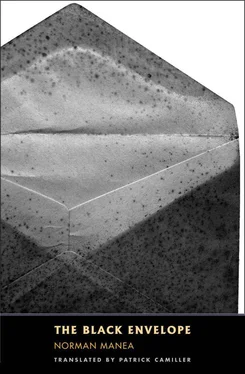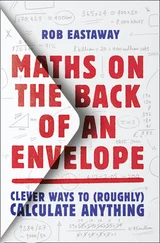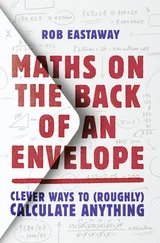Tolea had left the bathroom and was lying on the sofa with a book in his hand. He prepared his role, working out the bits of impertinence and the quotations that would irritate his colleagues at the Hotel Tranzit. Maybe someone had brought a bottle of whiskey for Comrade Teodosiu. Perfect: well, Gic  old man, a comrade left that smoky bottle for you. Or maybe the optician Corkscrew had arranged a room for some boss man or other. Perfect: at twelve he’ll be coming with a slim little lady in a red silk dress; fine, no one will disturb them; fine, we won’t interfere — see nothing hear nothing say nothing. But we’ll drive you nuts with Terence and Baronius and Otto III. The Saint: the idealistic politician. “In turn he offered to Romans the spectacle of his holy majesty and the aspiration to complete solitude in a hut of clay and reed.” The Holy See, electric chair, apocalypse … twilight of the world … mundus senescit . And love, of course: the reign of love on earth, for a thousand years, frater, dulcissime frater, a thousand and one years, amantissime .
old man, a comrade left that smoky bottle for you. Or maybe the optician Corkscrew had arranged a room for some boss man or other. Perfect: at twelve he’ll be coming with a slim little lady in a red silk dress; fine, no one will disturb them; fine, we won’t interfere — see nothing hear nothing say nothing. But we’ll drive you nuts with Terence and Baronius and Otto III. The Saint: the idealistic politician. “In turn he offered to Romans the spectacle of his holy majesty and the aspiration to complete solitude in a hut of clay and reed.” The Holy See, electric chair, apocalypse … twilight of the world … mundus senescit . And love, of course: the reign of love on earth, for a thousand years, frater, dulcissime frater, a thousand and one years, amantissime .
His neighbor Gafton had gone into the bathroom: he could hear Matei Gafton coughing and grunting. “Under the formidable pressure of the vast nomadic hordes … people had to go among the Romans to find safety and even food … We must admit the benevolence and even wisdom of the emperors who accepted those nomads … what historians call the infiltration of the barbarians.” Recite that to the barbarians? “Fruges, non viri,” as brother Gerbert, the dulcissimus, said. “The fruits of the earth, yes, but not people”— that’s the kind of aphorism that should interest Corkscrew and Gina, yes, or rather there’s room for speculation about such nonsense, really there is; brother Gerbert, amantissimus , has a head full of dross and long rigmaroles. He threw down the book and put on his black corduroys and black shirt: his uniform. That was how he appeared at the Hotel Tranzit: in work uniform. That is, in mourning clothes. He had several pairs of trousers and ten or so black shirts: they could be made of cotton, linen, jersey fabric, silk, so long as they were black. That was how Professor Anatol Dominic Vancea Voinov reported for work at the Hotel Tranzit reception.
He put on the black overalls as if they were a suit of armor. Yes, that was it. At least that was left, the defiance, and he did not complain that that was all it was — of course not. Night had scattered— that was the real victory. The calendar was made up only of days, coming one after the other. Night was a shapeless swamp, mere nothingness, a black hole. Thank God he had escaped again. You can never be sure you’ll reach the frontiers of a new day. What a wonderful event was the day — oh yes, Don Dominic Vancea was ready. The story was beginning again: the cacophony, the miracle of the day would be returned to him. Dressed in black, freshly shaven, head gleaming like the polar moon, hands in his pockets, lips pursed to whistle. “Disillusionment itself is a fire, and reality is a waking dream. The good luck to die before the death of one’s passions”— yes, Maître d’Aurillac, that’s right. A dry brow, upright and solid like that of a Roman senator. Roman the baldness, and the eyes as well. He’s at the door, ready to leave. He takes the key from his pocket, along with a large red handkerchief. In his black work clothes, and in his white clothes of idleness and life, a handkerchief is always included. Preferably red. White, black — sometimes a white one, a black one. But 5 percent red, as nature requires. Nature and aesthetics: 5 percent red. He slowly wipes his bald patch. Today, too, he’s late: again they’ll growl at him when he arrives. More proof that nothing has changed, that it’s all the same, everything in its place.
Everything in place, dulcissime , we can leave. Here we go, amantissime , we’re starting again.
The repeated sound of the bell. No, not the bell. The telephone was ringing. He staggered between chair and table to pick up the receiver.
“Toma. My name’s Toma …”
Hesitation, then silence. Yes, he remembered the voice, and he also remembered the name of the man who had already tried several times to speak to him. A polite languid young man, this Toma. How’s that for the new block manager! As if people didn’t know who these double employees are and who they work for.
He had appeared at the door one morning out of the blue. A decent-enough face, a pleasant voice, and by the time you wake up he’s already inside — like the ones who wreck apartments and set fire to cats. Polite, smarmy — and that’s that, he’s got his hands on you, even if you haven’t any dogs, cats, or canaries. It’s other matters that interest him. “May I come in? And might I bother you for a chat some other time?”
The swine! But now he’d finally given as good as he got, on the telephone. At least now there’d be a day or two of respite. Then the siege operations would inevitably start again. And why? What was the reason for them in the end? Simply because he didn’t have any contact with the neighbors? Or because he didn’t go to tenants’ meetings or paid the maintenance charges six months in advance so as to keep out of the management’s way? No, those weren’t the only reasons: there must be others, of course there must. That had been obvious at the incident on Saturday evening, when the careful manager, returning home after midnight, had found the lights still on in the ground-floor canteen. He had gone in and headed straight for the table at the back of the empty hall. What are you doing here? Nothing. I’m looking around. Don’t you know it’s the foreign students’ canteen and tenants aren’t allowed to use it? I didn’t know, but it doesn’t interest me either. At this time there’s no canteen here: it’s an empty hall. And what are you looking at exactly? His tone of voice no longer bore any resemblance to the time when he had tried to cringe and sweet-talk his way to a longer interview. It was the dry, official tone of a guard who has surprised a villain long under observation. And what exactly did you say you were looking at? A long time passed before he replied. I’m looking at the hall. There once used to be a bar here — the Bar Levcenco. During the war and before. The functionary did not seem surprised at what he had heard. He pulled up a chair and was obviously preparing to discuss the matter. But he gawked as the tenant simply stood up and left, without even glancing at him.
Confusion, memories — the ghosts of the Vancea legend, which have been trailing him all the time recently, of which he has been thinking constantly for so many months, which have been summoning him again and again. And now the little flunky of our times, Comrade Manager Toma, or whatever his damned grade is.
He had taken a card from the pile on the table. Cavafy. “For some a day comes when they have to say the great Yes or the great No.” Pages, circled text, arrows. His name, Marcu Vancea, crossed out, rewritten, underlined. Monday, Tuesday, Wednesday — nights with their whispers and breakdowns and phantoms, the capricious play of thoughts.
Had Toma’s phone call been a joke or a warning? Remember, he appears when you’re not expecting him, like the first time. “At once he sees who has Yes within him ready/and saying it thither goes,” so warned the Greek from Alexandria. He moved the book from table to nightstand, from there to the top of the radio, then to the sofa. “Why is there this apathy in the Senate? Why do the senators stand around and not legislate? Because today the barbarians will arrive.” It is quiet: lazy shadows in the playing daylight, emaciated faces slinking along the dirty, darkened streets. The door seemed to shake. A pale youth with soft wavy hair. Very long mustache and a timid smile. Small scar by the eyebrow, thin murmur of a voice.
Читать дальше

 old man, a comrade left that smoky bottle for you. Or maybe the optician Corkscrew had arranged a room for some boss man or other. Perfect: at twelve he’ll be coming with a slim little lady in a red silk dress; fine, no one will disturb them; fine, we won’t interfere — see nothing hear nothing say nothing. But we’ll drive you nuts with Terence and Baronius and Otto III. The Saint: the idealistic politician. “In turn he offered to Romans the spectacle of his holy majesty and the aspiration to complete solitude in a hut of clay and reed.” The Holy See, electric chair, apocalypse … twilight of the world … mundus senescit . And love, of course: the reign of love on earth, for a thousand years, frater, dulcissime frater, a thousand and one years, amantissime .
old man, a comrade left that smoky bottle for you. Or maybe the optician Corkscrew had arranged a room for some boss man or other. Perfect: at twelve he’ll be coming with a slim little lady in a red silk dress; fine, no one will disturb them; fine, we won’t interfere — see nothing hear nothing say nothing. But we’ll drive you nuts with Terence and Baronius and Otto III. The Saint: the idealistic politician. “In turn he offered to Romans the spectacle of his holy majesty and the aspiration to complete solitude in a hut of clay and reed.” The Holy See, electric chair, apocalypse … twilight of the world … mundus senescit . And love, of course: the reign of love on earth, for a thousand years, frater, dulcissime frater, a thousand and one years, amantissime .










